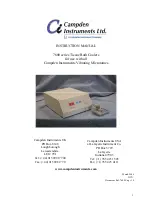
Appendix C: Fiberglass 30 Specifications
Product Service 1-800-522-7658
47
Original instructions
ANSI Z9.5-2011 Laboratory Standard
Covers entire laboratory ventilation system.
New and remodeled hoods shall have a monitoring device
Ductless hoods should only be used with non-hazardous materials
American Industrial Hygiene Association
2700 Prosperity Avenue, Suite 250
Fairfax, VA 22031
(703) 849-8888
SEFA 1-2002
Fume hood face velocities based on toxicity levels of chemicals
Class A – 125 to 150 fpm
Class B – 80 to100 fpm
Class C – 75-to 80 fpm
Test method – face velocity profile and smoke generation
Scientific Equipment & Furniture Association
1028 Duchess Drive
McLean, VA 22102
(703) 538-6007
NFPA 45 – 2002 Fire Protection for Laboratories Using Chemicals
Laboratory hoods should not be relied on for explosion protection
Exhaust air from fume hoods should not be recirculated
Services should be external to the hood
Canopy hoods only for non-hazardous applications
Materials of construction should have flame spread of 25 or less
80 to 120 fpm to prevent escape
NFPA 30 – 2000 Flammable and Combustible Liquids Code
Approved cabinets may be metal or wood
Vent location on cabinets are required
Venting of cabinets not a requirement
National Fire Protection Association
1 Batterymarch Park
P.O. Box 9101
Quincy, MA 02269-9101
(800) 344-3555
General References
American Conference of Governmental Industrial Hygienists
. Industrial Ventilation, A
Manual of Recommended Practice,
Cincinnati, OH
ASHRAE Standard Committee.
ASHRAE Standard
Atlanta: ASHRAE Publications Sales
Department, 1995
British Standards Institution
, Laboratory Fume Cupboards
. Parts 1, 2 and 3, London: 1990
Department of Labor, Occupational Safety and Health Administration,
29 CFR Part 1910,
Occupational Exposures to Hazardous Chemicals in Laboratories, Final Rule
. Vol. 55,
No. 21. Washington D.C.:1990


































